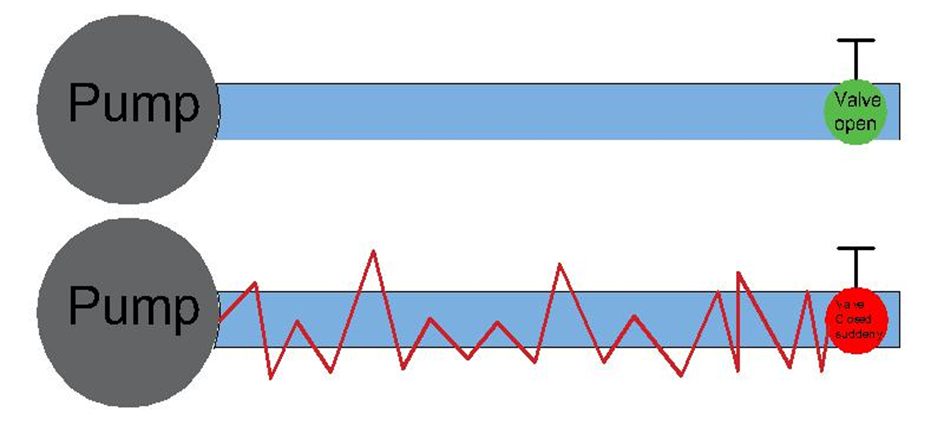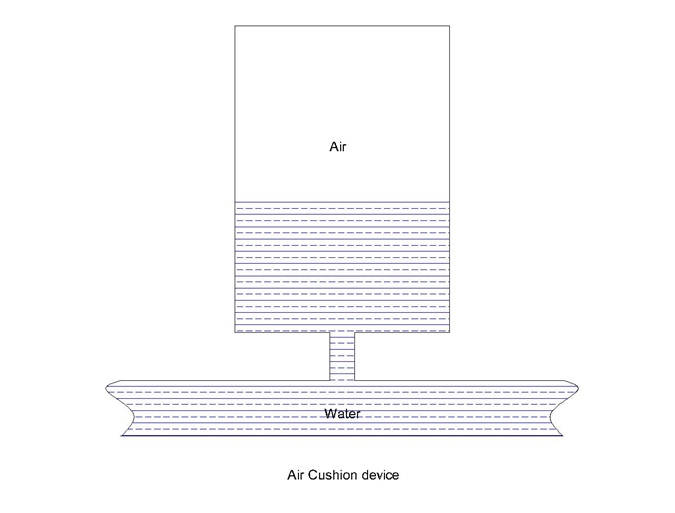Pressure surge in plumbing system
Pressure surge in plumbing system is mainly caused due to the
changes in velocity of flow in the system. Pressure surge in plumbing system is
also known as water hammer. The phenomena of water hammer are more prominent on
pipes transporting liquids. It is usually assumed that liquids are
incompressible, unlike gases they cannot be compressed as much. The pressure
surge in plumbing system can occur whenever a valve is suddenly closed, a pump
starts and stops, or, by expulsion of air from the piping system. Pressure
surges cannot occur in pipes that are open.

Fig: Water hammering or pressure surge when valve is closed suddenly
When the tap or a valve in a plumbing system is fully opened,
the flow in the pipe increases. The flow velocity of the water in the pipe
increases. When the valve is closed quickly, the water volume builds up
upstream of the valve. The pressure rises and the so-called pressure wave front
expands in the opposite direction of the original flow. The waves travel
backward against the original direction of flow until they encounter a solid
resistance, such as a check valve. There, the pressure surge is reflected. It
runs back and forth until the pressure wave has dissipated.
Strength
of pressure surge
The strength
of pressure in pipes can be calculated with use of Joukowsky equation
∆p =
ρ · a · ∆v
∆p=
Joukowsky surge = pressure change in a liquid [N/m2]
∆v =
velocity change
ρ = density
of the liquid [kg/m3]
a = wave
propagation velocity in liquid-filled pipe [m/s]
Effects of pressure surge on plumbing systems
When the pressure surge or water hammer occurs in a pipe it can cause deterioration of pipe over time. Liquids are often assumed as incompressible. In real life scenario, liquid is not perfectly incompressible, the liquid may absorb some of the shock till the limit exceeds. When the pressure surge is not severe, the effects of it maybe vibration, rattling or hammering noises from pipe. When the surge is more than that of the pipe pressure rating, the pipe will rupture. The pressure surge can also result in loosening of pipe fasteners, weakening of joints, deformation of pipes, damage to pump lining and pipe inner surface.
Minimizing pressure surge in plumbing system
Some of the
ways to control pressure surge or water hammer are as follows:
- Installing
water hammer arrestor: Water hammer arrestors are shock or surge absorbing
devices that helps in controlling water hammer or pressure surge. These devices
have two chambers, separated by a moving medium like piston or diaphragm. One
chamber is connected to the pipeline carrying the liquid and other houses a
calculated amount of gas. The chamber connected to the pipeline is filled with
fluid being transmitted through pipe. When surge occurs, the surge is absorbed
by the gas in the chamber by moving of piston and compressing the gas.
- Water
pressure: A high-water pressure in the plumbing can increase the effect of
water hammer. Maintaining correct amount of pressure by use of pressure reducing
valves will reduce water hammer.
- Water cushion devices: Water cushion devices are basically expansion tanks that are connected to the plumbing system which uses the compressibility of air or gas to absorb the surge.

- Using of
slow closing valves: These valves close gradually to reduce the occurrence of
water hammer. The abrupt closing of valves in a pressurized system can result
in water hammer.
- Pipe lengths
and diameter: When designing plumbing system, by keeping short pipe lengths and
large diameter can reduce the flow velocity and can reduce effect of water
hammer.
- Using check
valves or NRV: Check valves or NRV, when placed at right position can prevent
backflow of liquid and causing pressure surge. These can also help in
protecting devices like gauges, valves, etc by placing check valve after these
devices and ensure longer life.
No comments yet. Start a new discussion.